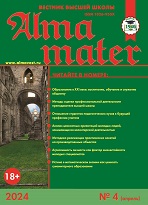UDC 17: 37.01
https://doi.org/10.20339/AM.07-19.044
E.I. Besedina is Cand.Sci. (Philology), doc. at St.-Petersburg Electrotechnical University e-mail: elivbesedina@mail.ru; N.V. Maklakova is Cand.Sci. (Pedagogy), doc. at Kazan Federal University e-mail: natalim.16@mail.ru; and I.A. Maklakov is Cand.Sci. (Philology), doc. at Kazan Cooperative Institute e-mail: one_i@mail.ru
Presented is study of moral ethical dimension as system formatting component of educational and breeding process. The problem is more urgent today, than ever before, since there are too many examples of teachers’ unethical behavior both in and out of classroom. The article discusses different aspects of the problem (how it is represented in legal documents, what theoretical foundation it is based on, how basic ethical principles work in practice, etc.). The research indicate, that though discussions of teachers’ ethical responsibilities have a long history and are founded on profound legal and methodological basis of pedagogical practice, there is a gap between the obvious necessity for teachers’ conscious ethical behavior and current situation in teaching practice. The study suggests possible causes of such and ways to it’s overcoming.
Key words: education, educational and breeding process, pedagogical ethics, students, teacher, moral values.
References
- Andreev, V.I. Pedagogical ethic: innovative course for moral self-development. Kazan, 2012.
- Belukhin, D.A. Pedagogical ethic: willingness and reality. Moscow, 2007.
- Lavrentieva, N.B., Nechaeva, A.V. Pedagogical ethic. Barnaul, 2010.
- Khudik, V.A., Fesenko, Yu.A. Didactic as mistakes of breeding and training of children and teenagers. Vestnik of Cherepovets state university. 2015. No. 7, P. 147–151.
- Bryman A. Social research methods. Oxford University Press,2004.
- Campbell E. The ethics of teaching as a moral profession. Curriculum Inquiry. 2008. С. 357–384.
- Gross, E.R. Clashing values: Contemporary views about cheating and plagiarism compared to traditional beliefs and practices. Education. 2012. 132. 2. C. 435–440.
- Holma, K. Fallibilist pluralism and education for shared citizenship. Educational Theory. 2012. C. 397–409.
- Newman, O. No child is an island: Character development and the rights of children. Educational theory. 2012. No. 62. C. 91–106.
- Sockett, H. The moral base for teacher profes-sionalism. New York, 1993.
- Sanger, M. The schizophrenia of contemporary education and the moral work of teaching. Curriculum Inquiry. 2012. No. 42. C. 285–307.
- Veugelers, W. Education and humanism: Linking autonomy and humanity. Springer Science & Business Media, 2011.











.png)






